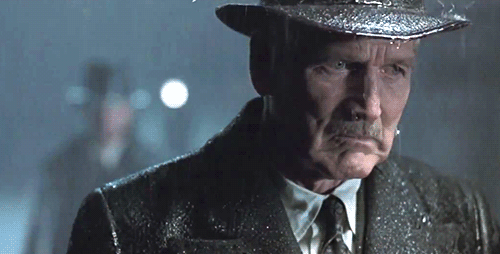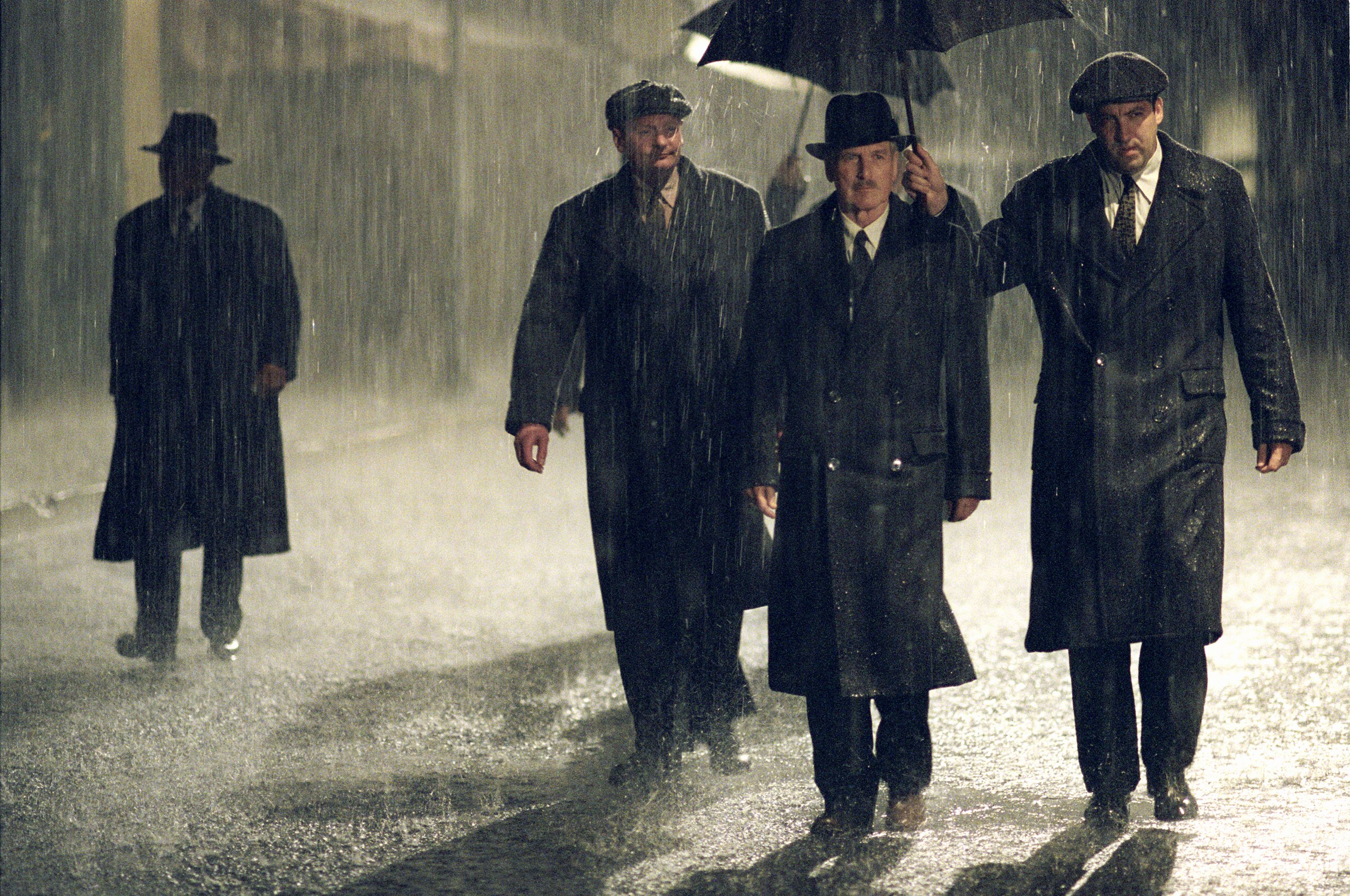While one might remember Road To Perdition as the movie where Tom Hanks played a negative character, it is much more than that. It can be compared to one of those Greek tragedies that cleansed the heart through pity and terror, purging us of our petty concerns and sufferings.
Road to Perdition is one of those rare movies which succeeds on almost every level. Even though being a pretty cold movie it has that faint warmth of sunshine, the empty feeling of despair that hooks the audience, melts their hearts, and sways their mind to a feeling of empathy and love.
While the plot might seem slow-paced to some, it is the sophisticated acting and the astute cinematography makes Road to Perdition a must-watch. Conrad Hall’s cinematography creates a void of darkness, uncertainty, and fear. A lot of those scenes happening in the backdrop of rain create that eerie feeling, that fear that gives a visceral chill.
“When people ask me if Michael Sullivan was a good man or if there was just no good in him at all, I always give them the same answer.”
The film begins with these lines being narrated by Michael Jr. (Tyler Hoechlin) with a long shot of his character from behind and it slowly moves towards him as to a medium shot and stops as we go back in time to witness his recollection of his memory of his father that made him say those lines.

The story involves three sets of fathers and sons, two biological and one emotional. John Rooney (Paul Newman) is the head of an Irish crime family with his two lieutenants being Michael Sullivan (Tom Hanks) and son Connor Rooney (Daniel Craig). Even though Michael isn’t biologically related to John, he shares a great deal of love and respect for him as is evident from his line from later in the film, “We had nothing, he gave us a home, a life. We owe him.” After Peter asks Michael Jr., “What does dad do for a job”, he hides in the back of his dad’s car only to witness a murder. This is followed by an outburst by John on his son which is received very poorly by him. Already burning in hatred and jealousy of his dad, John’s love and trust towards Sullivan, Connor murders Mrs. Sullivan and Peter. This sets up the premise of the movie as Sullivan tries to protect his son and at the same time take revenge on Connor whereas on the other hand, John protects Connor even though knowing that he had been stealing from him and of his untrustworthy and merciless nature.
The movie shows the unconditional love of parents towards children and to what lengths they go to ensure their well-being. As we see John tear up and say, “I curse the day, you were born” to Connor but immediately hug him after that. He knows Connor is a disgusting man, he knows it is he who is at fault and not Sullivan, yet he cannot denounce him. Instead, he protects him from Sullivan.
Conrad Hall does an amazing job of setting up the mood of the film with his brilliant shots. One of the best moments is the aftermath of when John asks Connor to apologize for his irrational behavior. As everyone leaves the room slowly the camera focuses on Connor’s face and slowly zooms towards him but what follows is a ‘rack focus’ from Connor’s face to John and Sullivan’s backs leaving the room. Connor cannot see them there but it is his thoughts that we are following. This single brilliant
shot tells us of the mindset of his character. Now, of course, Sam Mendes makes terrific use of his actors and cinematographer as he directs the movie to an emotional showdown where Sullivan holds John at his gunpoint and we hear John say, “I am glad it is you” as he gets shredded with bullets. The absence of the sound of gunfire before that scene when John’s bodyguards are massacred makes us anticipate what is to come, it gives us a respite, a feeling of calmness in the face of impending disaster but he quickly snatches it away as we hear the gunfire in full display as John gets murdered. John knew what was coming he wanted it to happen, he knew he had wronged him, not just Sullivan but a whole lot of people as he says, “There are only murderers in this room” referring to himself and Sullivan in an earlier scene.
One of my favorite moments in the film is the conversation between Sullivan and his son in the farmer’s house. On Michel Jr’s asking if Sullivan loved Peter more than him, he denies it. According to him, Peter was a sweet kid whereas Michael was more like him and he didn’t want him to be, he didn’t want his son to get his hands dirty, to have to do what he had done. It is here we understand Sullivan never liked killing those people, but he had no other choice, he had committed those murders for his family, and for his sons to have a good life. But he never wanted Michael to walk on the same path as him.
This leads us to the very end of the film when Sullivan gets shot by Maguire (Jude Law), a private assassin hired to kill Sullivan. Even at the very brink of death, Sullivan doesn’t let Michael get blood on his hands as he uses the last of his breath to kill Maguire. Now, Sullivan meets a suitable death, he had indeed killed several people, out of compulsion or not but he had always been a good father, he didn’t let his son have that life, he protected him with his life. The last shot is the same as the opening of the movie indicating life has come a full circle when we hear Michael uttering the same words as before but this time with a reply, “ When people ask me if Michael Sullivan was a good man or if there was just no good in him at all, I always give them the same answer, I tell them, He was my father”…
Movies like this are hard to come by which leaves one with a vacant feeling, which leaves us wondering what could have been but what’s happened has happened, and perhaps for the best. There are no good or bad people here, just normal human beings operating in the gray between the black and white. What separates them is where their allegiance lies.
-Sagnik Datta
